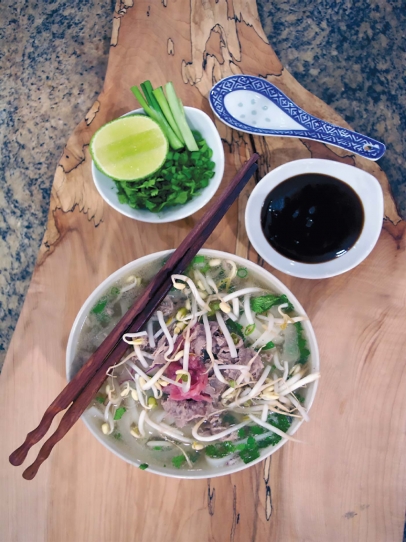Personal Essay: Simple as Soup
I clutched my grandfather’s ragged photo album to my chest as I peered into the kitchen looking for my grandmother, Bà ngoai. Per usual, she hovered over a large pot, which was emitting the distinct aroma of pho throughout the house. My mind was abuzz with questions as I tiptoed towards her. I did not want to distract her from the delicate seasoning of the boiling broth, but my inquisitive 10-year-old self couldn’t wait. When I blurted out my stream of questions about Vietnam, Bà ngoai looked at me with eyes reflecting a million memories and indicated the stool beside her.
Earlier that day, my family had taken the seven-hour drive to my grandparents’ home, tucked away into the winding green mountains of Vermont. Ever curious, I scrambled into my grandfather’s lap as soon as we arrived, eager for a glimpse into his photo albums. Usually, I saw blurry pictures of my mom as a little girl or smudged, grainy photographs of Vermont where my grandpa grew up. This time, he handed me a thick, black album. I opened it, and dust billowed from each crack in the binding. Inside were landscapes I had never seen, alongside countless men in matching uniforms shown through faded Polaroid photos. I looked questioningly at the pictures, waiting for a story, an explanation. My grandfather considered me for a moment, then broke out into tales of the war and Vietnam, someplace far away where he had met my grandmother. Of course, I had known about Vietnam before, but this was the first time I was truly hearing about it, and it opened a wave of eagerness to learn more about Ba ngoai’s home.
I stood on the stool in the kitchen, waiting in excited anticipation for answers, but Bà ngoai had another idea. As she handed me ingredients, I soaked rice noodles, sliced onions, and diced scallions. I watched her labor by the broth for hours, letting each flavor marry in the pot, while we talked. I asked questions, she answered, and I listened. Meanwhile, the ginger, anistar, onion, and beef simmered and danced in the boiling broth, emitting mouth-watering aromas that dispersed in invisible plumes. By dinnertime, the pho was ready, and my questions were answered.
That night, my family and I sat at the dinner table, with pho on the menu. My red ceramic bowl sat in front of me, steaming gently like the white fog that hovers over my ocean home of Nantucket. My chopsticks, wooden and delicately detailed, grasped for a thin, white rice noodle, which lifted easily out of the rich hickory brown of the broth. I had garnished my bowl the same way I always do, with a handful of the scallions chopped in uniform circles, a few crisp arcs of onion, along with a sprig of cilantro. Of course, I never forget plenty of fresh-squeezed lime, plus a healthy dose of hoisin sauce along with heaps of bean sprouts. The resulting bowl was full of endless flavors distinct to our culture, a culture that I had a new appreciation for, thanks to the photographs my grandfather showed me that day, as well as Ba ngoai’s own stories and memories.
Pho was my grandmother’s link to the home she left behind after the war, where the sweet, strong scent of pho had floated through the air more than halfway across the world. The dedication to teaching others our tradition, and continuing to pass it along, will allow both pho and Vietnam to remain part of my family forever. I had expected complex answers to the questions bouncing through my head, but instead, Ba ngoai provided me with a different perspective. She taught me about the importance of holding on to something as simple as soup, and that the courage to ask questions can yield much more than answers in the path of education. It can lead to greater knowledge and, above all, a more intangible understanding.
Editor’s Note: March 29, 2023, marks the 50th anniversary of the final withdrawal of U.S. combat troops from Vietnam.





